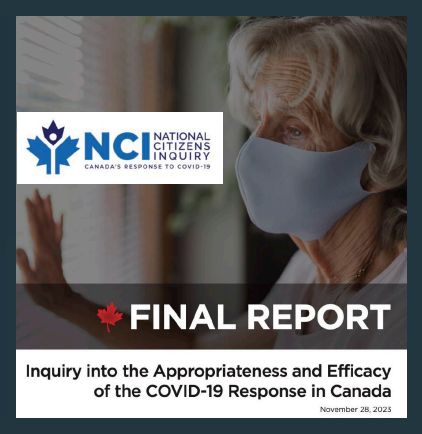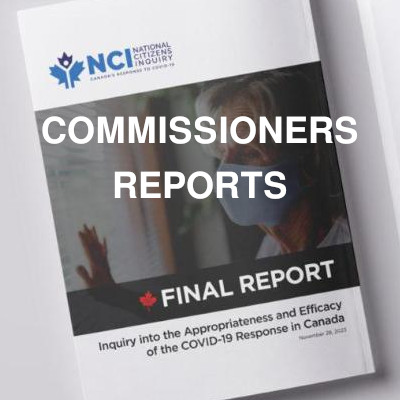Final Report
November 28, 2023
On Tuesday, November 28, 2023, the National Citizens Inquiry (NCI) released the final report of its months-long investigation into Canada's response to COVID-19.
Excerpts (pages 183-184):
"Canada is not a country that is founded on the principle of the collective over the individual. To the contrary, Canada's constitution provides that Canada is founded on the rule of law, and it guarantees the rights of individuals."
"7.1.4. The Constitution is the supreme law of Canada. The main parts were enacted in 1867 and 1982. The Constitution Act, 1867, created Canada as a country, and the Constitution Act, 1982, created the Canadian Charter of Rights and Freedoms (the Charter). Since the Charter is part of Canada's Constitution, it forms part of the supreme law of Canada, and governments are therefore not permitted to pass laws that violate the rights that it guarantees.
There is a reason that Canada (and many other countries) have enacted constitutional protection for individual rights and freedoms. Governments are not infallible, and institutions cannot be trusted on their own to protect individuals. History has demonstrated that even the most advanced societies can enact oppressive measures and trample on the rights and freedoms of some of their members. Canada is not necessarily immune from this, and its government actions should not be immune from scrutiny.
There is no doubt that many of the government measures in response to COVID violated Canadians' rights and freedoms under the Charter, including:
- freedom of thought, belief, opinion, and expression (s. 2(b));
- freedom of peaceful assembly (s. 2(c));
- freedom of association (s. 2(d));
- the right to move to and take up residence in any province (s. 6(2)(a));
- the right to pursue the gaining of a livelihood in any province (s. 6(2)(b));
- the right to life, liberty, and security of the person (s. 7);
- the right to be secure against unreasonable search or seizure (s. 8);
- the right not to be arbitrarily detained or imprisoned (s. 9);
- the right not to be subjected to any cruel or unusual treatment or punishment (s. 12);
- the right to be equal before and under the law (s. 15); and
- the right to equal protection and equal benefit of the law without discrimination based on race, national or ethnic origin, colour, religion, sex, age, or mental or physical disability (s. 15)."
Click here to download the Final Report as a PDF.
Complete video presentation of the release of the Final Report.
Jump to:
Video commentary of Shawn Buckley.
{ Lawyer specializing in criminal, regulatory and constitutional law }
Video commentary of Ken Drysdale.
{ Retired Professional Engineer }
Video commentary of Dr. Bernard Massie.
{ Ph.D. in microbiology and immunology }
Video commentary of Heather DiGregorio.
{ Senior law partner and a top tax expert in Canada }
Video commentary of Janice Kaikkonen.
{ Ph.D. in Theology and Discipleship, works primarily with vulnerable populations and youth }
Video commentary of Ches Crosbie.
{ Retired Lawyer specializing in class action suits }
Question and Answer period.
Complete video presentation of the release of the Final Report.
Jump to:
Video commentary of Shawn Buckley.
{ Lawyer specializing in criminal, regulatory and constitutional law }
Video commentary of Ken Drysdale.
{ Retired Professional Engineer }
Video commentary of Dr. Bernard Massie.
{ Ph.D. in microbiology and immunology }
Video commentary of Heather DiGregorio.
{ Senior law partner and a top tax expert in Canada }
Video commentary of Janice Kaikkonen.
{ Ph.D. in Theology and Discipleship, works primarily with vulnerable populations and youth }
Video commentary of Ches Crosbie.
{ Retired Lawyer specializing in class action suits }
Question and Answer period.
More Reports
Discover more about the NCI
Links to ALL 325 Testimonies of 2023
See ALL 325 Testimonies here
... or by categories below ...
... or by categories below ...
- Medical Topics
- Legal Topics
- Other Topics
- Expert Witnesses
How can you spread the message that They Lied?
Stay up to date with our Newsletter
Click here to read it,
or subscribe below ...
or subscribe below ...
Click here to STOP the Globalist Agenda
Click here to support our work.
Click here to email us at contact@theylied.ca

 Click here to view
Click here to view













